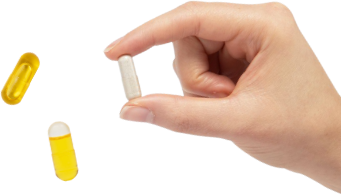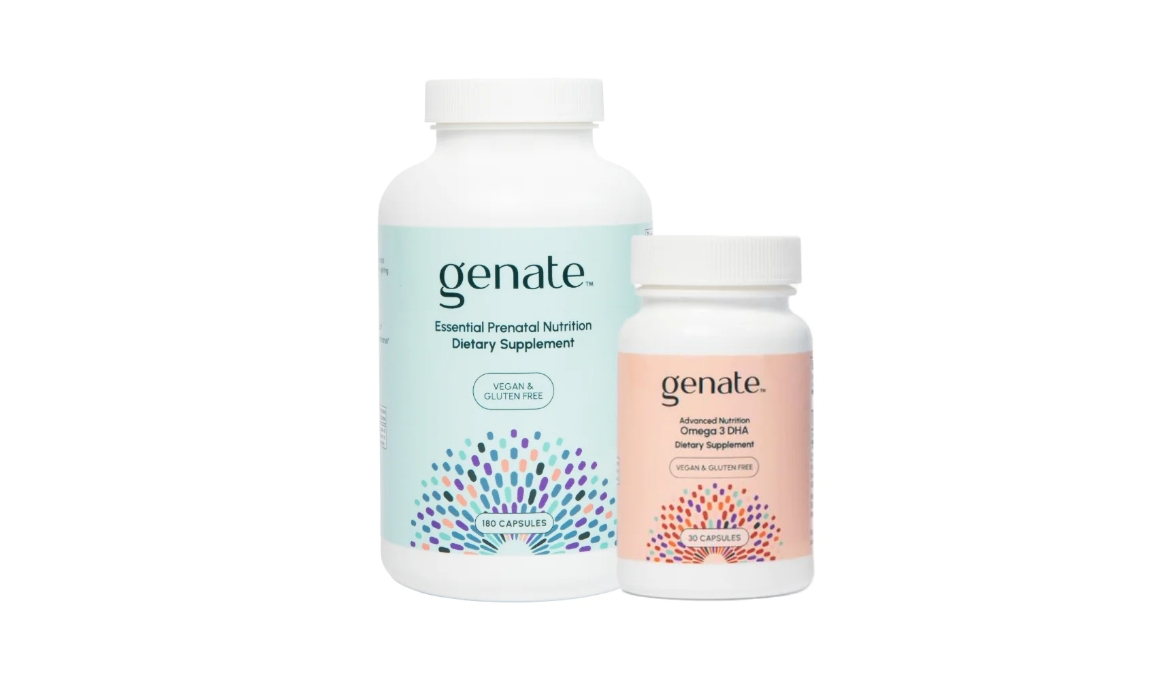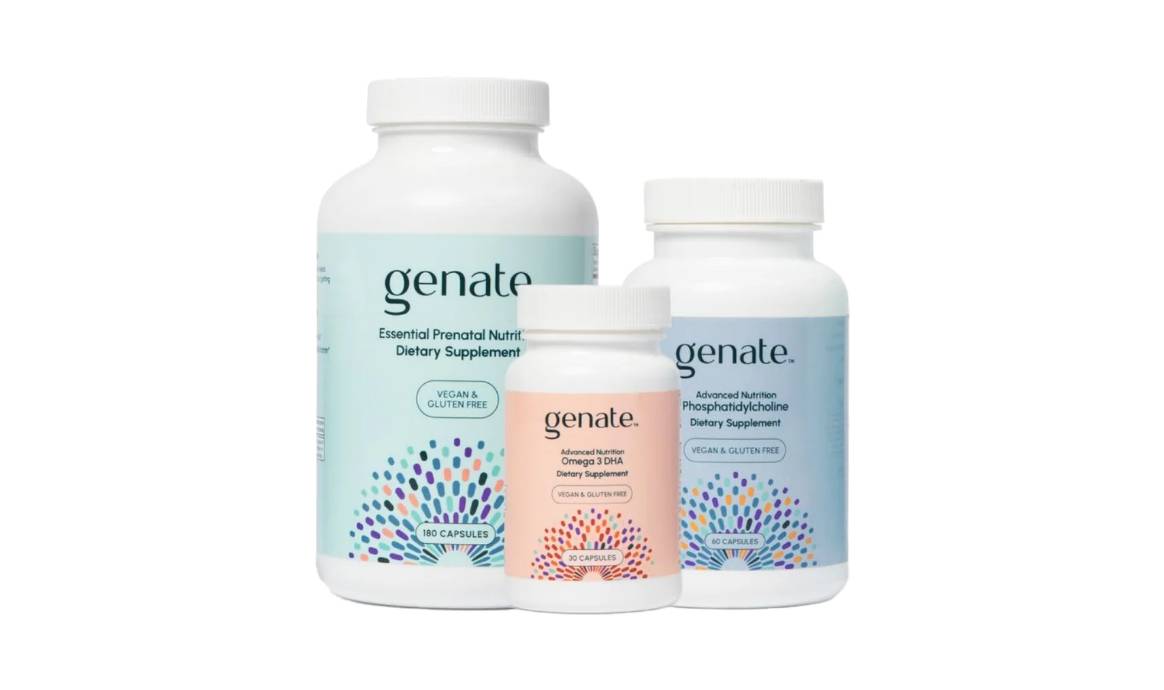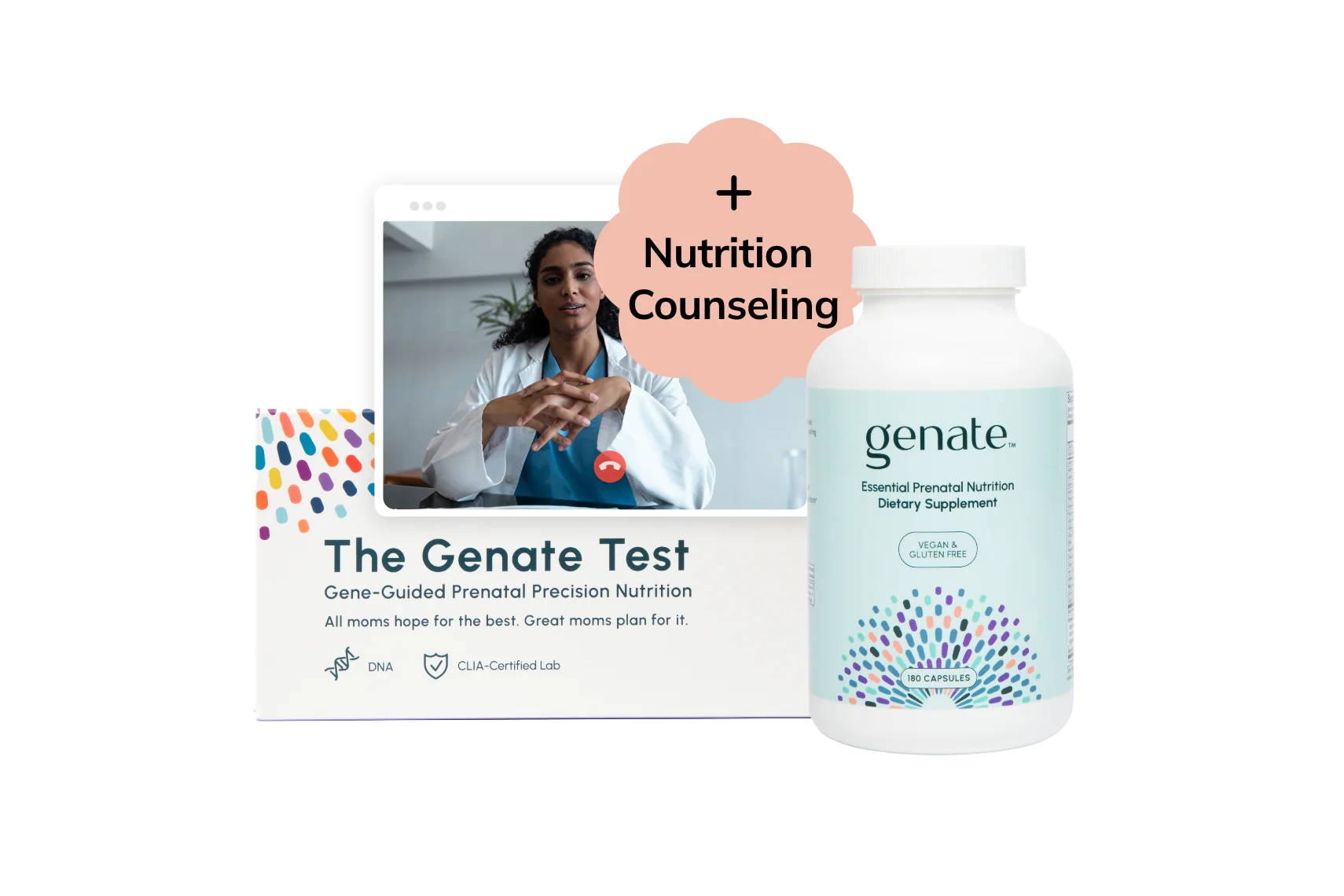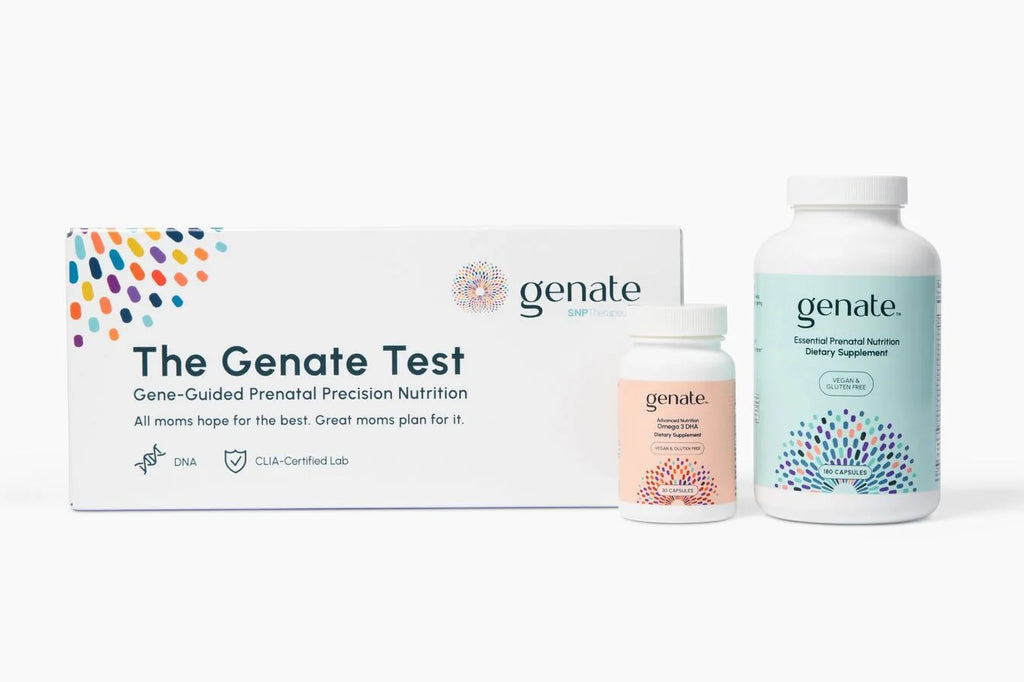Good nutrition is essential for every stage of your baby’s growth and development. But the efficiency with which your body metabolizes nutrients is partly determined by your genes, and common genetic variants can affect the metabolism of one-carbon nutrients that are critical for the development of your child’s brain and spinal cord. Genate Essential Prenatal Nutrition is a multivitamin formulated from academic research that provides women with a formulation optimized to support their baby’s cognitive development. It includes the one-carbon nutrients choline, betaine, methylfolate, and B vitamins that many women have trouble metabolizing and/or don’t get enough of in their diet.

PRENATALS
A Guide to Taking Prenatal Vitamins Before Pregnancy
Should you take prenatal vitamins before you get pregnant? Follow this guide to learn about the importance of prenatal vitamins and why you should take them when trying to conceive.
by Libby Pellegrini, MMS, PA-C
Medically reviewed by Cara Everett, MS, RDN, LDN
January 4, 2024 • 6-minute read
When you’re planning to get pregnant, it’s important to prepare your body for this major life change. Part of that process is taking a prenatal vitamin that meets your individual needs.
Prospective mothers are faced with many choices that can impact their health and that of their baby, including the right way to take prenatal vitamins before pregnancy. If you’re seeking answers to questions such as “How long does it take prenatal vitamins to work?” and “How long should I take a prenatal supplement before getting pregnant?” follow this guide for everything you need to know.
Are Prenatal Vitamins Important Before Pregnancy?
Yes. Prenatal vitamins and the ideal first trimester diet not only help support the beginning of your pregnancy, but the right prenatal vitamin is also essential before you get pregnant. This is because prenatal vitamins help prepare your body for pregnancy ahead of time.
Taking a prenatal vitamin when you’re trying to conceive also ensures that you’re supporting your baby’s development in the earliest days before you see a positive pregnancy test.
Folate and Choline
One of the best examples of this relates to neural tube and brain development.
The neural tube is the foundation of your baby’s brain and spinal cord, and it’s one of the first parts of the body to form. By the fourth week of pregnancy, the neural tube is closing so that the brain and spinal cord can begin developing. (1)
Some women don’t even know they’re pregnant by the fourth week, and one-carbon nutrients such as folate and choline are critical for neural tube development during this time. (2) Deficiencies in essential nutrients like folate and choline have been linked to neural tube defects. (3) But by taking a comprehensive prenatal vitamin when you’re planning to conceive, you’ll be helping your baby’s health off to a good start.
The Importance of Iron
When you start taking a prenatal vitamin, it can take some time for nutrient stores to build up in your body. This is especially true if you're deficient in any given nutrient.
For example, iron deficiency is common in women. (4) Iron needs increase in pregnancy to support your expanded blood volume and the baby’s iron needs. (5) For this reason, starting a prenatal vitamin with iron before pregnancy is a great way to make sure you’re optimizing your iron supply.
When Should I Start Taking Prenatal Vitamins?
Health experts at the Mayo Clinic recommend beginning a prenatal vitamin at least three months before pregnancy. They also say it’s a smart idea for all women of childbearing age to take a daily prenatal supplement. (6)
Prenatal vitamins may take anywhere from one month to three months to be most effective in terms of establishing nutrient stores, especially folic acid. The American College of Obstetricians and Gynecologists (ACOG) advises women to begin taking a prenatal vitamin containing 400 mcg of folic acid at least one month before pregnancy. If you’re at higher risk of neural tube defects, talk to your healthcare provider about starting a high dose of folic acid three months before trying to conceive. (7)
According to ACOG, taking a prenatal vitamin before the start of pregnancy can also help reduce symptoms of nausea and vomiting that often occur in the first trimester. Prenatal vitamins are also associated with a lower risk of miscarriage.
What Regimen Should I Follow?
Follow one simple rule when deciding on your prenatal vitamin regimen: Create a plan that’s easy to follow and stick with.
Dosing Schedule
For ease of use, many women prefer a one-a-day prenatal vitamin. But keep in mind that the most comprehensive prenatal vitamins, including those that contain choline and DHA, require more capsules and need to be split into two or three doses for the best tolerance and absorption. It’s important to read and follow the directions on the bottle or package. Learn more from Genate about the best time to take your prenatal vitamins.
Tolerance
When choosing a prenatal vitamin, finding one you can tolerate is important. Many women find that it takes a few trials before they can find a prenatal vitamin that suits them for daily use.
Capsule vs. Powder
In terms of formulation, the decision between a capsule and a powder also depends on tolerance and ease of use. For example, women who find that capsules upset their stomach may prefer mixing a powder into a smoothie or cold drink.
Another consideration when it comes to taking a prenatal vitamin is the effect of your genes on metabolism of nutrients such as folate, choline, and DHA. This is why getting genetic screening before pregnancy can be such a valuable tool when choosing a prenatal supplement.
Should I Take a Prenatal Vitamin if I'm Not Planning on Getting Pregnant?
It's not necessary to take prenatal vitamins if you aren't trying to get pregnant unless you've been advised to do so by your healthcare provider. Prenatal vitamins can support overall health with essential nutrients like folate, calcium, and vitamin D. But some prenatals include elevated amounts of vitamins and minerals that can cause toxicity at high levels, such as iron and vitamin A.
If you think you may need a prenatal vitamin but aren’t planning to get pregnant, talk to your doctor or other healthcare provider for guidance.
The Bottom Line
Taking prenatal vitamins before you get pregnant can ensure your body is in the optimal state to support a healthy pregnancy. Experts recommend beginning a prenatal vitamin three months before the start of pregnancy, to help your body build up a supply of nutrients.
For more insight on optimizing your nutrition during pregnancy, learn how the Genate Test and nutrigenetic counseling from registered dietitians can help you develop a personalized nutrition plan that meets your needs.
Learn more about the science behind our mission to support expectant mothers’ nutrition and health every step along the way of their pregnancy journey. Then meet our team of medical experts and professionals dedicated to ensuring your baby is healthy and happy from the start.
This article is not intended as medical advice to treat or diagnose any health condition but rather as educational health information for the general public. It should not be used as a substitute for individualized medical care from your healthcare provider.
Shop the Article
Save 23% today!
Genate Essential Prenatal Multivitamin + Advanced Omega-3 DHA Package
Bundle to increase savings and provide the foundational nutrients needed for optimal health and development.
From $72 per month
Save 23% today!
Comprehensive Prenatal Support Package
Genate Essential Prenatal Multivitamin + Advanced Omega-3 DHA + Phosphatidylcholine
Our most comprehensive bundle - you’ll receive our Essential Prenatal Multivitamin, Advanced Phosphatidylcholine, and Advanced Omega-3 DHA.
From $110 per month
Save 30% today!
Comprehensive Prenatal Nutrition Bundle
Buy the Genate Test and a nutrition counseling session with a Genate registered dietitian, and receive a 30-day supply of the Genate Essential Prenatal Multivitamin FREE. Purchase includes a 90-day prenatal multivitamin subscription at our best monthly price.
$309

About Libby Pellegrini, MMS, PA-C
Libby Pellegrini, MMS, PA-C, is a professionally trained journalist and physician assistant. She has worked in numerous healthcare settings, including the rural United States, an inner-city Level I trauma center, and several suburban acute care centers. It was during her time at a functional medicine clinic in Southeast Asia that she developed an interest in the role of SNPs in personalized genetic evaluation and discovered how gene-guided nutritional counseling can enhance individual health outcomes.
Libby graduated Magna Cum Laude from Northwestern’s Medill School of Journalism, and her medical writing has appeared in a number of outlets, including WebMD, RxSaver, KevinMD, NPHIC, and Men’s Health.
Website: https://libbypellegrini.com/
LinkedIn: https://www.linkedin.com/in/libby-pellegrini-pa-c/
References
- When does brain development begin? Zero to Three. https://www.zerotothree.org/resource/when-does-brain-development-begin/ Published May 24, 2014. Accessed October 16, 2023.
- Irvine N, England-Mason G, Field CJ, Dewey D, Aghajafari A. Prenatal folate and choline levels and brain and cognitive development in children: a critical narrative review. Nutrients. 2022;14(2):364. https://doi.org/10.3390/nu14020364
- Neural tube defects. Johns Hopkins Medicine. https://www.hopkinsmedicine.org/health/conditions-and-diseases/neural-tube-defects Accessed October 16, 2023.
- Iron-deficiency anemia. Office on Women’s Health. https://www.womenshealth.gov/a-z-topics/iron-deficiency-anemia Updated February 22, 2021. Accessed October 16, 2023.
- Iron is important during pregnancy. Oklahoma State University. https://extension.okstate.edu/fact-sheets/iron-is-important-during-pregnancy.html Published April 2022. Accessed October 16, 2023.
- Prenatal vitamins: why they matter, how to choose. Mayo Clinic. https://www.mayoclinic.org/healthy-lifestyle/pregnancy-week-by-week/in-depth/prenatal-vitamins/art-20046945 Published April 19, 2022. Accessed October 16, 2023.
- Good health before pregnancy: pre pregnancy care. American College of Obstetrics and Gynecology. https://www.acog.org/womens-health/faqs/good-health-before-pregnancy-prepregnancy-care Updated December 2021. Accessed September 24, 2023.
Take the Genate Quiz
Take our Nutrition Quiz to learn more about your nutrition journey.
Read Our Latest Articles
Frequently Asked Questions
What are the benefits of my baby getting the proper nutrients?
What are one-carbon nutrients and fatty acids, and why are they important?
One-carbon nutrients and fatty acids are critical for brain and spinal cord development during pregnancy and through the first two years of life. Although all nutrients are important, the one-carbon nutrients choline, folate, betaine, and B vitamins, along with the omega-3 fat DHA, provide the building blocks for proper growth of your developing baby's brain. Research at Cornell and Harvard universities has shown cognitive benefits for children born to mothers who received increased levels of one-carbon nutrients during pregnancy, demonstrating that optimal nutrition during pregnancy can have lasting effects for your baby.
If I buy Genate nutrition supplements, do I still need to take the test?
Genetic testing is a personal choice, and only you can decide what’s best for you and your baby. But the Genate Test is a powerful tool for optimizing your nutrition status, as it identifies genetically-caused metabolic inefficiencies that may influence your body’ ability to make and use the nutrients critical for your baby’s cognitive development. If you have SNPs in any of the nutrient pathways tested, your Genate Report will provide personalized recommendations for optimizing your nutrition. Our registered dietitians can show you how to fill in the gaps with foods and supplementation, if needed, to make sure you’re getting the nutrition you and your baby need.

